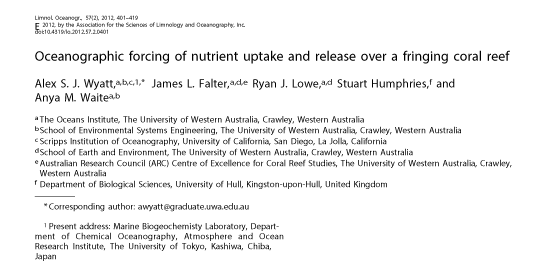Oceanographic forcing of nutrient uptake and release over a fringing coral reef
Alex S. J. Wyatt, James L. Falter, Ryan J. Lowe, Stuart Humphries and Anya M. Waite
Nitrate and nitrite (NOx) and phosphate (PO4) dynamics over Ningaloo Reef, Western Australia, are shown to depend on oceanographic forcing of coupled mass transfer limited (MTL) gross uptake and gross release from remineralized oceanic particulate organic matter (POM). Estimates of gross release rates increased significantly with increasing POM uptake and were of the same order as gross uptake rates. Gross uptake rates increased significantly with increasing oceanic concentrations and wave energy dissipation, were 35–80% higher over the reef crest (7–9 mmol NOx m−2 d−1 and 4–5 mmol PO4 m−2 d−1), and were significantly correlated with independent estimates of POM-mediated gross NOx uptake, supporting both MTL uptake and the strong role of oceanic POM supply. The relative supply of NOx and POM was linked to the seasonal dynamics of a regional current system. In late spring, upwelling associated with seasonally strong equator-ward winds led to increased NOx concentrations (0.71 ± 0.2 µmol L−1), POM < NOx and the reef was a net nutrient sink (5390 mmol NOxm−1 d−1 and 270 mmol PO4 m−1 d−1). In contrast, during the autumn, NOx was low (0.16 ± 0.06 µmol L−1), but POM > NOx and the reef was a net nutrient source (−7060 mmol NOx m−1 d−1 and −730 mmol PO4 m−1 d−1). The autumn enhancement of oceanic POM supply to the reef can be attributed to a regional phytoplankton bloom associated with acceleration of the oligotrophic Leeuwin Current, which may result in a significant supply of dissolved nutrients to downstream communities.

